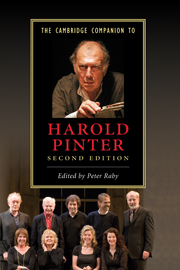Book contents
- Frontmatter
- Introduction
- Part I Text and Context
- Part II Pinter and Performance
- Part III Reactions to Pinter
- 14 Pinter’s sexual politics
- 15 Pinter and the critics
- 16 Pinter as celebrity
- 17 Pinter, politics and postmodernism (2)
- 18 The Pinter paradigm: Pinter’s influence on contemporary playwriting
- 19 Afterword: Harold Pinter and cricket
- Bibliography
- Main Index
- Works Index
- Series List
16 - Pinter as celebrity
from Part III - Reactions to Pinter
Published online by Cambridge University Press: 28 November 2009
- Frontmatter
- Introduction
- Part I Text and Context
- Part II Pinter and Performance
- Part III Reactions to Pinter
- 14 Pinter’s sexual politics
- 15 Pinter and the critics
- 16 Pinter as celebrity
- 17 Pinter, politics and postmodernism (2)
- 18 The Pinter paradigm: Pinter’s influence on contemporary playwriting
- 19 Afterword: Harold Pinter and cricket
- Bibliography
- Main Index
- Works Index
- Series List
Summary
Harold Pinter's artistic achievements and political activities have made him a celebrity and, like other processes of enlargement or amplification, fame can distort that to which it draws attention. As early as 1971, Pinter was making distinctions between his own perception of himself and his public image: “I must admit I tend to get quite exhausted about being this Harold Pinter fellow . . . He's not me. He's someone else's creation. Quite often when people meet me and they shake me warmly by the hand and say they're pleased to meet me, I have very mixed feelings - because I'm not quite sure who it is they think they're meeting.” It is likely that Pinter was referring at that time to an idea of who he was drawn from the plays he had written and what had been written about them, what Robert Cushman has described as 'this thing in the public consciousness - this cryptic, aloof, uncommunicative thing called “Pinter”'. More recently, Pinter's political interventions and the reactions they have garnered have called another version of himself into being, 'the Angry Playwright', in Michael Billington's words, 'who made good knocking copy for journalists'. Public perception of Pinter as an individual is shaped by others as much as it is by the man himself, and the associations brought to the public mind by the word 'Pinter' lie further still from his control. This chapter explores Pinter as he is perceived, for better or for worse. Through the media, the opinions of the famous are sought and disseminated on all kinds of matters, as notable figures are quizzed about their likes and dislikes across a range of fields. We learn from questionnaires published in the Guardian, for example, that Pinter is the living person whom novelist Tim Lott most admires, 'not', Lott is quick to point out, 'for his politics but because he's England's only surviving literary genius'.
- Type
- Chapter
- Information
- The Cambridge Companion to Harold Pinter , pp. 266 - 282Publisher: Cambridge University PressPrint publication year: 2009
- 2
- Cited by

